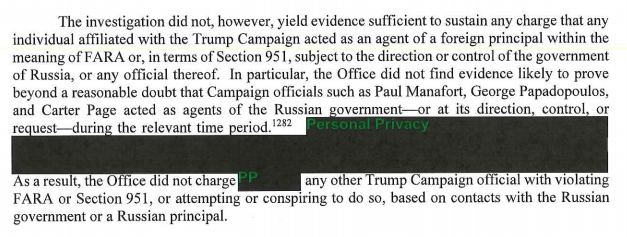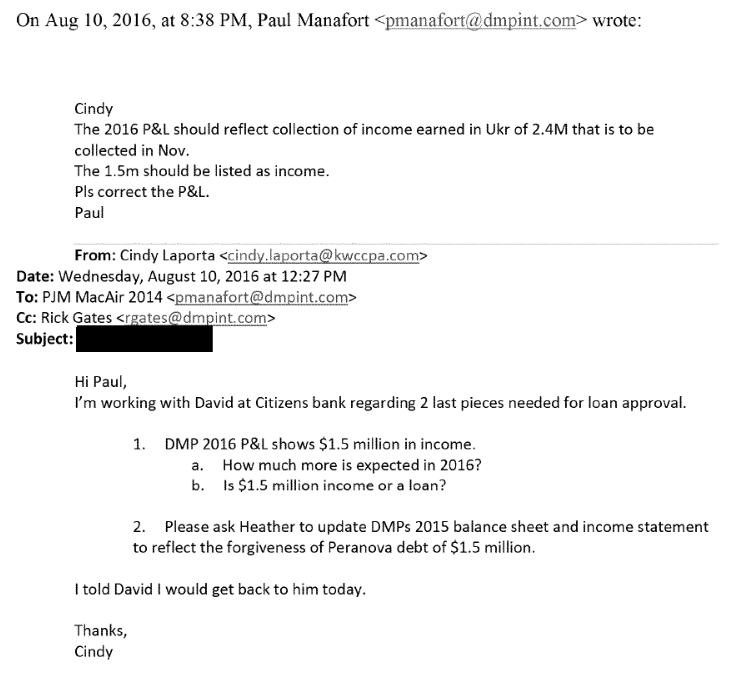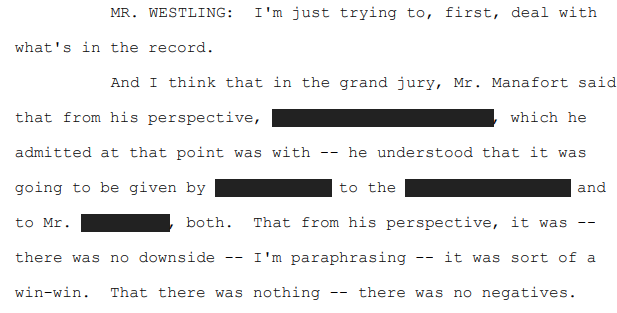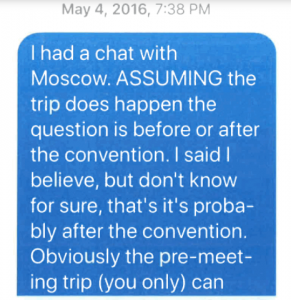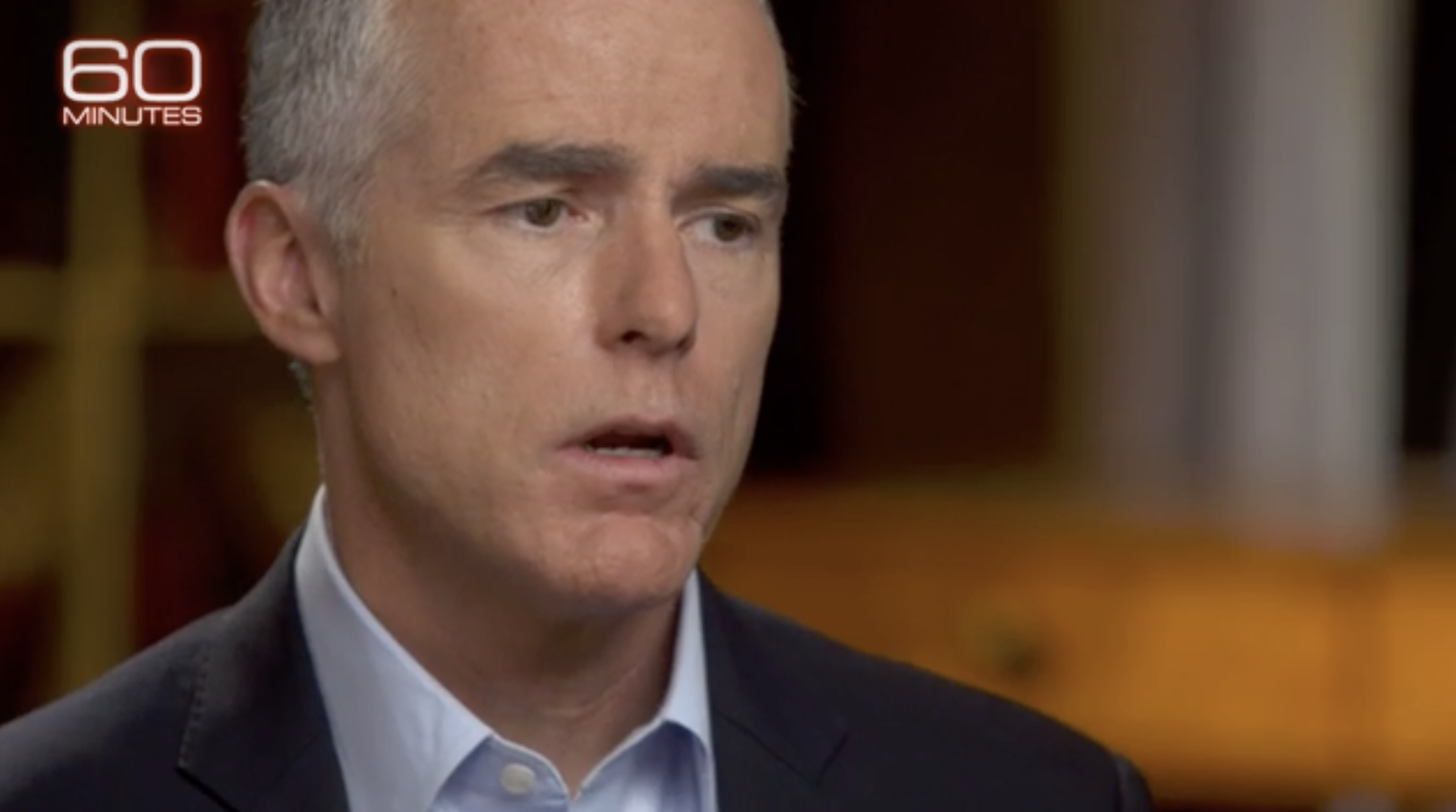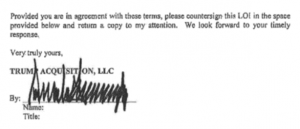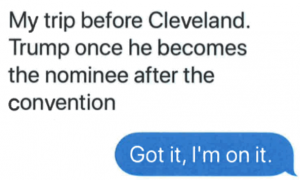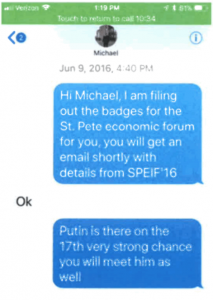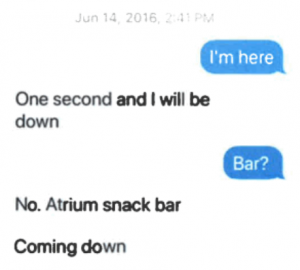In an attempt to undercut Andrew McCabe’s publicity tour, the President is on a tear, attacking what he claims was McCabe and Rod Rosenstein’s “treasonous” insurance policy.
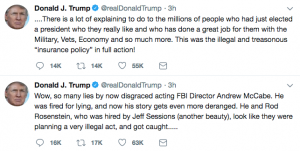
We’re at a point where both sides are making claims of treason, which only serves to feed the intensity of both sides, without convincing Trump’s supporters (and other denialists) that the concerns about Trump’s loyalty — and therefore the investigation that McCabe opened into him — are well-grounded.
But there are neutral third party observers here, weighing the claims of loyalty. Four different sentencing processes have sided with those questioning the loyalty of Trump and those close to him.
George Papadopoulos
In the first two cases where Trump flunkies have been sentenced, the flunkies themselves have pointed to how their own misplaced loyalties caused them to commit crimes. In George Papadopoulos’ sentencing memo, he attributed the actions that led to his prosecution — his attempts to broker a meeting between Putin and Trump — to a desire to curry Trump’s favor.
Eager to show his value to the campaign, George announced at the meeting that he had connections that could facilitate a foreign policy meeting between Mr. Trump and Russian President Vladimir Putin. While some in the room rebuffed George’s offer, Mr. Trump nodded with approval and deferred to Mr. Sessions who appeared to like the idea and stated that the campaign should look into it.
George’s giddiness over Mr. Trump’s recognition was prominent during the days that followed the March 31, 2016 meeting. He had a sense of unbridled loyalty to the candidate and his campaign and set about trying to organize the meeting with President Putin.
Papadopoulos says he lied to the FBI out of loyalty to Trump.
Mr. Papadopoulos misled investigators to save his professional aspirations and preserve a perhaps misguided loyalty to his master.
[snip]
George explained that he was in discussions with senior Trump administration officials about a position and the last thing he wanted was “something like this” casting the administration in a bad light. The agents assured him that his cooperation would remain confidential.
More specifically, he lied to avoid tainting the Trump campaign with any tie to Russia.
George found himself personally conflicted during the interrogation as he felt obligated to assist the FBI but also wanted to distance himself and his work on the Trump campaign from that investigation. Attempting to reconcile these competing interests, George provided information he thought was important to the investigation while, at the same time, misleading the agents about the timing, nature, and extent of his contacts with Professor Mifsud, Olga, and Ivan Timofeev. In his answers, George falsely distanced his interactions with these players from his campaign work. At one point, George told the agents that he did not want to “get too in-depth” because he did not know what it would mean for his professional future. He told the agents he was “trying to help the country and you guys, but I don’t want to jeopardize my career.”
George lied about material facts central to the investigation. To generalize, the FBI was looking into Russian contacts with members of the Trump campaign as part of its larger investigation into Russian interference with the 2016 election. This issue had dominated the news for several months with stories concerning Carter Page and Paul Manafort. The agents placed this issue squarely on the table before George and he balked. In his hesitation, George lied, minimized, and omitted material facts. Out of loyalty to the new president and his desire to be part of the administration, he hoisted himself upon his own petard.
I have argued that this memo served the dual purpose of accepting responsibility while signaling others and reaffirming his loyalty to Trump, and I stand by that. Given his efforts to reverse his sentence, Papadopoulos show of contrition at his hearing was just that, a ruse. But it was one of the things that convinced Judge Randolph Moss to impose just two weeks. Another, however, were the comments of Papadopoulos’ lawyer, Thomas Breen, who argued Trump had obstructed the Mueller investigation far more than his client had.
Trump, Breen said, “hindered this investigation more than George Papadopoulos ever could,” by calling the FBI’s Russia inquiry a “witch hunt” and casting doubt on credible allegations of wrongdoing by his associates.
“The president of the United States, the commander in chief, told the world that this was fake news,” Breen said, contrasting this with Mueller’s “professional” and “well-prepared” team.
In imposing prison time, Moss emphasized that Papadopoulos lied about a manner of grave importance.
The judge noted that most defendants convicted on a false-statement charge don’t get any prison time, but he said he considered the Mueller investigation “a matter of enormous importance.” Moss, an appointee of President Barack Obama who served as a top Justice Department official under President Bill Clinton, described the inquiry as an attempt to investigate an “effort to interfere in our democracy.”
“It’s important that the public know there are real consequences when you mislead and tell lies to the FBI about a matter of grave national importance,” he said.
[snip]
Breen said his client was trying to preserve his job prospects in the Trump administration, but Moss told the lawyer that those were “not noble reasons to tell a lie.”
“This was fairly calculated,” the judge said. “It took six months for Mr. Papadopoulos to correct the record.”
So Papadopoulos’ lawyers agreed his loyalties were misplaced and Judge Moss judged that Papadopoulos’ lies pertained to something that strikes at the integrity of our democracy.
Michael Cohen
As Papadopoulos did, Michael Cohen attributed his obstruction to his blind loyalty to Trump and a desire to sustain Trump’s false narrative denying ties to Russia.
I made these misstatements to be consistent with Individual 1’s political messaging and out of loyalty to Individual 1.
In his cynical, Lanny Davis-crafted statement at sentencing, Cohen talked about how he put loyalty to Trump over that to his family, ending with an apology to the US.
I blame myself for the conduct which has brought me here today, and it was my own weakness, and a blind loyalty to this man that led me to choose a path of darkness over light. It is for these reasons I chose to participate in the elicit act of the President rather than to listen to my own inner voice which should have warned me that the campaign finance violations that I later pled guilty to were insidious.
Recently, the President Tweeted a statement calling me weak, and he was correct, but for a much different reason than he was implying. It was because time and time again I felt it was my duty to cover up his dirty deeds rather than to listen to my own inner voice and my moral compass. My weakness can be characterized as a blind loyalty to Donald Trump, and I was weak for not having the strength to question and to refuse his demands.
[snip]
I stand behind my statement that I made to George Stephanopoulos, that my wife, my daughter, my son have my first loyalty and always will. I put family and country first. My departure as a loyal soldier to the President bears a very hefty price.
For months now the President of the United States, one of the most powerful men in the world, publicly mocks me, calling me a rat and a liar, and insists that the Court sentence me to the absolute maximum time in prison. Not only is this improper; it creates a false sense that the President can weigh in on the outcome of judicial proceedings that implicate him.
[snip]
I want to apologize to the people of the United States. You deserve to know the truth and lying to you was unjust.
In sentencing Cohen, Judge William Pauley pointed to how his ties to Trump and the access that gave him led him to lose his moral compass.
[H]is entire professional life apparently revolved around the Trump organization. He thrived on his access to wealthy and powerful people, and he became one himself.
[snip]
But somewhere along the way Mr. Cohen appears to have lost his moral compass and sought instead to monetize his new-found influence. That trajectory, unfortunately, has led him to this courtroom today.
Cohen’s guilty plea — particularly the way he tried to cabin off cooperation implicating his family — is cynical as hell. But to the extent he is willing to help prosecutors, it entails being treated as a traitor by the President.
Mike Flynn
The other two Trump flunkies who’ve gotten close to sentencing are even more striking — in part because they have been less successful at crafting a fiction about setting their loyalty to Trump or other paymasters aside.
Flynn was set to get probation until he and his lawyer used their own sentencing memo to continue the line all the other loyal Trump flunkies have, suggesting that the investigation was illegitimate.
There are, at the same time, some additional facts regarding the circumstances of the FBI interview of General Flynn on January 24, 2017, that are relevant to the Court’s consideration of a just punishment.
At 12:35 p.m. on January 24, 2017, the first Tuesday after the presidential inauguration, General Flynn received a phone call from then-Deputy Director of the FBI, Andrew McCabe, on a secure phone in his office in the West Wing.20 General Flynn had for many years been accustomed to working in cooperation with the FBI on matters of national security. He and Mr. McCabe briefly discussed a security training session the FBI had recently conducted at the White House before Mr. McCabe, by his own account, stated that he “felt that we needed to have two of our agents sit down” with General Flynn to talk about his communications with Russian representatives.21
Mr. McCabe’s account states: “I explained that I thought the quickest way to get this done was to have a conversation between [General Flynn] and the agents only. I further stated that if LTG Flynn wished to include anyone else in the meeting, like the White House Counsel for instance, that I would need to involve the Department of Justice. [General Flynn] stated that this would not be necessary and agreed to meet with the agents without any additional participants.”22
Less than two hours later, at 2:15 p.m., FBI Deputy Assistant Director Peter Strzok and a second FBI agent arrived at the White House to interview General Flynn.23 By the agents’ account, General Flynn was “relaxed and jocular” and offered to give the agents “a little tour” of the area around his West Wing office. 24 The agents did not provide General Flynn with a warning of the penalties for making a false statement under 18 U.S.C. § 1001 before, during, or after the interview. Prior to the FBI’s interview of General Flynn, Mr. McCabe and other FBI officials “decided the agents would not warn Flynn that it was a crime to lie during an FBI interview because they wanted Flynn to be relaxed, and they were concerned that giving the warnings might adversely affect the rapport,” one of the agents reported.25 Before the interview, FBI officials had also decided that, if “Flynn said he did not remember something they knew he said, they would use the exact words Flynn used, . . . to try to refresh his recollection. If Flynn still would not confirm what he said, . . . they would not confront him or talk him through it.”26 One of the agents reported that General Flynn was “unguarded” during the interview and “clearly saw the FBI agents as allies.”27
While Emmet Sullivan — ever on guard against prosecutorial misconduct — might have done so anyway, this led the judge to ask for the paperwork behind Flynn’s claims. Which in turn led to the production of really damning details of Flynn’s lies. That, in turn, led Sullivan to hesitate before sentencing Flynn, in part because the “great deal of nonpublic information in this case” he read led him to grow disgusted about what Flynn had done. Sullivan, as the first judge to read in detail about Mueller’s underlying investigation, said some absolutely remarkable things (and note, at least some of this language pertains to Flynn selling out to Turkey, not Russia).
I’m going to also take into consideration the aggravating circumstances, and the aggravating circumstances are serious. Not only did you lie to the FBI, but you lied to senior officials in the Trump Transition Team and Administration. Those lies caused the then-Vice President-Elect, incoming Chief of Staff, and then-Press Secretary to lie to the American people. Moreover, you lied to the FBI about three different topics, and you made those false statements while you were serving as the National Security Advisor, the President of the United States’ most senior national security aid. I can’t minimize that.
Two months later you again made false statements in multiple documents filed pursuant to the Foreign Agents Registration Act. So, all along you were an unregistered agent of a foreign country, while serving as the National Security Advisor to the President of the United States.
[snip]
COURT: All right. I really don’t know the answer to this question, but given the fact that the then-President of the United States imposed sanctions against Russia for interfering with federal elections in this country, is there an opinion about the conduct of the defendant the following days that rises to the level of treasonous activity on his part?
[snip]
I mean, arguably, that undermines everything this flag over here stands for (indicating). Arguably, you sold your country out. The Court’s going to consider all of that. I cannot assure you that if you proceed today you will not receive a sentence of incarceration. But I have to also tell you that at some point, if and when the government says you’ve concluded with your cooperation, you could be incarcerated.
It could be that any sentence of incarceration imposed after your further cooperation is completed would be for less time than a sentence may be today. I can’t make any guarantees, but I’m not hiding my disgust, my disdain for this criminal offense.
So in this case, Flynn’s bid to discredit the investigation instead led to remarkable comments about how Flynn’s underlying crimes — the ones he lied to cover-up — amount to selling out his country.
Paul Manafort
Which brings us to Paul Manafort, who is currently facing what amount to be several life sentences because he refused to cooperate, even after promising to do so, against Trump and his Ukrainian and Russian paymasters. As I have noted, Manafort’s lies served to avoid giving the government evidence that Trump conspired with Russia to get elected.
But don’t take my word for it. In announcing her ruling in the breach determination last week, Amy Berman Jackson paid special attention to Manafort’s lies about Konstantin Kilimnik. The most important lie, it seems, pertains to Manafort sharing of detailed polling data with Kilimnik at a meeting where they also discussed sanctions relief in the guise of a Ukrainian peace detail. The description of whom Manafort intended that data to be shared with is redacted. But ABJ moved directly from describing the intended recipients to judging that sharing the data amounts to a link with Russia.
Also, the evidence indicates that it was understood that [redacted] would be [redacted from Kilimnik [redacted] including [redacted], and [redacted]. Whether Kilimnik is tied to Russian intelligence or he’s not, I think the specific representation by the Office of Special Counsel was that he had been, quote, assessed by the FBI, quote, to have a relationship with Russian intelligence, close quote. Whether that’s true, I have not been provided with the evidence that I would need to decide, nor do I have to decide because it’s outside the scope of this hearing. And whether it’s true or not, one cannot quibble about the materiality of this meeting.
[snip]
I don’t think that’s a fair characterization of what was said. The intelligence reference was just one factor in a series of factors the prosecutor listed. And the language of the appointment order, “any links,” is sufficiently broad to get over the relatively low hurdle of materiality in this instance, and to make the [redacted] Kilimnik and [redacted] material to the FBI’s inquiry, no matter what his particular relationship was on that date.
She continued by saying that she didn’t even have to determine whether — as the government claims — Kilimnik has active ties to GRU. Whatever Kilimnik’s ties to Russian military intelligence, ABJ still considers his relationship with Manafort to implicate coordination with the Russian government.
I also want to say we’ve now spent considerable time talking about multiple clusters of false or misleading or incomplete or needed-to-be-prodded-by-counsel statements, all of which center around the defendant’s relationship or communications with Mr. Kilimnik. This is a topic at the undisputed core of the Office of Special Counsel’s investigation into, as paragraph (b) of the appointment order put it, Any links and/or coordination between the Russian government and individuals associated with the campaign.
Mr. Kilimnik doesn’t have to be in the government or even be an active spy to be a link. The fact that all of this is the case, that we have now been over Kilimnik, Kilimnik, and Kilimnik makes the defense argument that I should find the inaccurate statements to be unintentional because they’re all so random and disconnected, which was an argument that was made in the hearing, is very unpersuasive.
ABJ’s most striking comments, however, came in language introducing why, even though she didn’t find that Mueller’s team had proven Manafort’s lies about conspiring with Kilimnik to be proven by a preponderance of the evidence, it nevertheless was obvious that what Manafort was trying to do in disclaiming a conspiracy with Kilimnik was to “shield his Russian conspirator.”
Mr. Manafort doesn’t just say to the agents, Kilimnik doesn’t believe he was pressuring the witness, or Kilimnik didn’t think he was suborning perjury, he didn’t intend to violate U.S. law, he makes the affirmative assertion that Kilimnik believed the project was a European project, when Manafort plainly knew that Kilimnik knew it wasn’t and the documents plainly reflect that it wasn’t, and that was the basis for the conspiracy count to which he pled guilty in the first place.
To me, this is definitely an example of a situation in which the Office of Special Counsel legitimately concluded he’s lying to minimize things here, he’s not being forthcoming, this isn’t what cooperation is supposed to be. This is a problematic attempt to shield his Russian conspirator from liability and it gives rise to legitimate questions about where his loyalties lie.
We have yet to get Mueller’s sentencing memo in the DC case or ABJ’s response to any claims they may make about why Manafort chose to face a life sentence rather than tell the truth about his conspiracies with Konstantin Kilimnik.
But it’s pretty clear that ABJ believes Manafort’s lies suggest he has suspect loyalties.
Four times so far in this investigation, Trump’s aides have started the sentencing process for their crimes designed to obstruction Robert Mueller’s investigation. All four times, before four different judges, their misplaced loyalty to Trump above country has come up. And with both Flynn and Manafort — where the judges have seen significant amounts of non-public information about the crimes they lied to cover-up — two very reasonable judges have raised explicit questions about whether Trump’s aides had betrayed their country.
Trump wants this to be a case of contested claims of betrayal. But the judges who have reviewed the record have used striking language about who betrayed their country.
As I disclosed last July, I provided information to the FBI on issues related to the Mueller investigation, so I’m going to include disclosure statements on Mueller investigation posts from here on out. I will include the disclosure whether or not the stuff I shared with the FBI pertains to the subject of the post.


